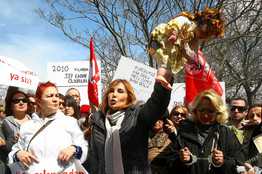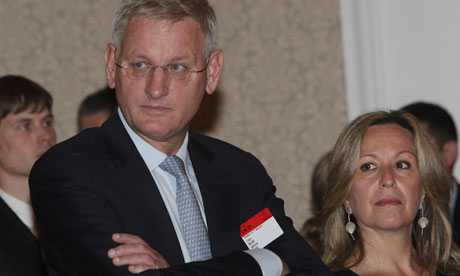Graphic Image Fuels Push to Protect Turkish Women
Photo of Stabbing Victim Puts Rights Issues on Front Page
By MARC CHAMPION
ISTANBUL—A Turkish newspaper’s front-page photograph of a woman with a knife sticking out of her naked back after her husband allegedly stabbed her has triggered controversy, in a nation dogged by high levels of domestic violence and so-called honor killings.

The photograph showed the victim, Sefika Etik, lying on a gurney as she was taken to an ambulance on Thursday. She was alive when the picture was taken, but died on the way to the hospital.
The publication of the graphic image the following day caused anger and protests, including by Ms. Etik’s family. Women’s-rights lawyer Deniz Bayram called it an act of “media violence” that infringed on the victim’s rights and dignity.
The controversy goes to the heart of Turkey’s struggle to reconcile traditional views of women as subordinated to family with international standards that protect the individual, analysts say.
Fatih Altayli, editor of the Haber Turk daily newspaper, where the photo appeared, defended his decision, saying he had “wanted people to see what domestic violence really is. I wanted to shock people.”
Mr. Altayli described women’s-rights organizations that protested outside the newspaper’s offices Sunday as “idiots” who knew nothing about “real life” and what it took to make the government act. “I knew people would criticize me, that they would say I was cruel, but someone had to do it,” he said in an interview on Tuesday. “Another six women have been killed since her.”
Turkey’s minister of Family and Social Policies, Fatma Sahin, was among those criticizing the decision. “If you use that kind of a horrible picture on your front page and say you did this to raise awareness, you also [have to consider] the psychological health of society and children,” she said on Turkey’s NTV television on Monday.
In a 2008 survey, 42% of Turkish women said they had been victims of physical or sexual violence. Turkey’s religious-conservative government has made strides in changing laws to address the scourge of domestic violence against women, including so-called honor killings by families, usually of wives, daughters or sisters on grounds that they have dishonored the family, activists say.
Yet many legal changes aren’t implemented, said Ms. Bayram, a lawyer with the Purple Roof women’s-rights organization.
Turkey is a signatory to numerous human-rights treaties that prompt comparisons with European countries, in which it fares poorly. In 2009, Turkey became the first state the European Court of Human Rights has held in violation of its obligations to protect women from domestic violence.
Ms. Sahin, who took over as family minister in June from a more conservative predecessor, is redrafting the country’s laws governing violence against women. Women’s-rights groups are due to give her their own proposed draft this week.
Rights groups hope, among other goals, that the new law will establish special police and prosecutors for domestic violence cases; that protections will no longer apply only to married women; that courts will be prohibited from considering passion, honor or other such factors as mitigating evidence in sentencing; and that police won’t be allowed to promote mediation between women and the partners from whom they have sought refuge, said Ms. Bayram.
Ms. Sahin named some of these as changes she planned to make. On NTV on Monday, she also said she would propose electronic tagging for men subject to restraining orders.
From 2005 through this past August, 4,190 women were killed as a result of domestic violence in Turkey, according to a study by the Human Rights Association, another Turkish nonprofit.
The current law on domestic violence, said Ms. Bayram, is called “Protection of the Family,” underlining what she and Mr. Altayli see as the core problem in Turkey. “Instead of being seen as individuals, women are seen as the loyal wife, the virtuous sister, the good mother and so on,” Ms. Bayram said.
Those cultural assumptions are shared by judges, prosecutors and police, said Mr. Altayli.
Police will tell a husband where he can find his wife in hiding, so that they can reconcile, he said.
Prosecutors and judges routinely reduce charges and sentences for men who kill on grounds that their wives were adulterous, or in some way dishonored them, said Ms. Bayram.
—Ayla Albayrak contributed to this article.
Write to Marc Champion at [email protected]
via Photograph Fuels Push for Turkish Women’s Rights – WSJ.com.


